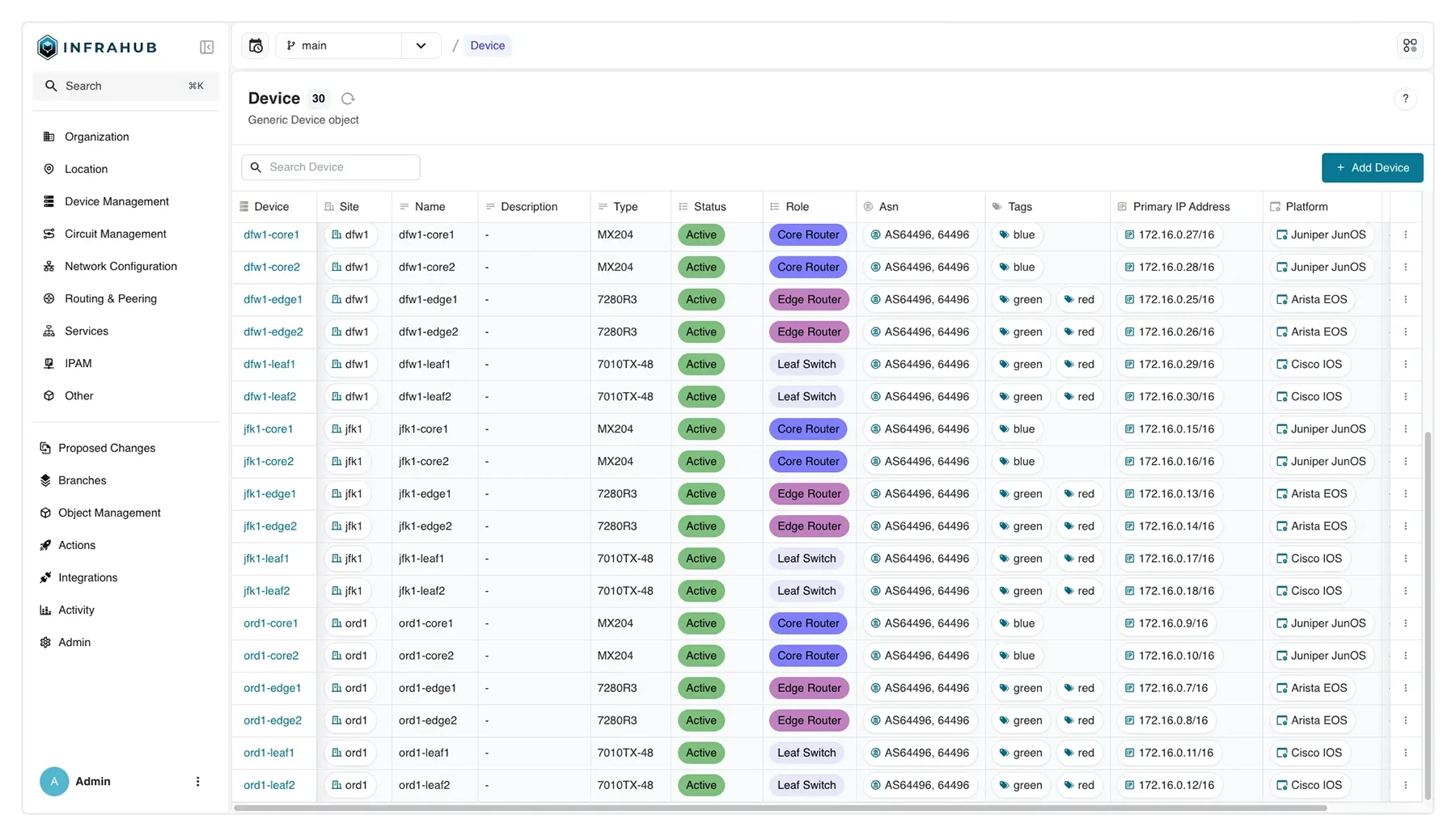Infrahub is a schema-first versioned data platform for managing networks, data centers, and cloud infrastructure. Eliminate fragmentation, scale automation, and deliver infrastructure as a reliable service.

Infrahub provides a single platform that unifies infrastructure data with business logic, enforces consistency, and integrates with automation tools and AI workflows.
With Infrahub as the data foundation in your automation stack, you can move faster, reduce risk, and deliver infrastructure as a reliable service.
Sync network and infrastructure device, service, and policy data into a unified source of truth, with rich metadata and robust UI and API access.
Generate, validate, and deploy configurations with unified data. Support full lifecycle management—provisioning, upgrades, decommissioning—across vendors and sites.
Expose automation through catalogs and APIs so application, platform, and ops teams can request infrastructure directly. Speed time to delivery, reduce errors, and make infrastructure more responsive to the business.
Model dependencies and relationships across infrastructure. Provide the data foundation for AI-driven reasoning, troubleshooting, and predictive operations.
Infrahub is purpose-built to be the validated data layer for network and infrastructure automation, and AI systems.
Define your own data models, extend them freely, and enforce them with validation. Infrahub’s flexible schema can capture any device, service, topology, and business context, ensuring every object is accurate and relationships are intact.
All data, automation logic, and rendered configs are version-controlled. Branching, peer review, roll-back, and audit capabilities bring the reliability and collaboration of GitOps to infrastructure.
Infrahub is designed to be composable. It integrates natively with Git repositories, and integrations with tools like Ansible, Terraform, and CMDBs are versioned, abstracted extensions of the core architecture. No plug-ins or custom scripts that break with changes.
Infrahub’s extensible design lets you add new vendors, services, processes, tools, and even entire data centers, without re-architecting or rewriting scripts. Since Infrahub and its foundations (Neo4j, Git, Prefect, GraphQL, Python) are open source, you gain long-term adaptability and vendor independence.

Just like automation, AI is only as good as the data behind it. Infrahub gives AI agents the complete, accurate infrastructure context they need to safely drive your automation.
Strong data foundation: AI gets the structured, validated infrastructure data it needs to avoid hallucinations and enable reliable automation recommendations.
Context that matters: Graph-based relationships give AI agents the full picture of dependencies, constraints, and business logic in your environment.
Faster schema development: Infrahub’s AI-assisted tools help you build custom schemas 80% faster while maintaining data integrity and accuracy.
Using Infrahub and Ansible
Using Infrahub and Ansible
For years, network and infrastructure automation teams have had to choose between tools that were structured but limiting, or flexible but unwieldy. As AI becomes ever-more critical to infrastructure automation, the gaps in legacy solutions get wider.
You get it all: a fully flexible schema with native Git-style version control, CI pipelines, a powerful query engine, and a user-friendly UI. All backed by enterprise support.
Offer initial structure as a quick way to get started.
Rigid relational databases make it hard to evolve the schema, do versioning at scale, or support AI.
JSON or YAML files provide flexibility.
No structured data model, validation, or query engine. AI can’t understand data relationships.
Gives you full control to build what you want.
Complex, expensive, and a constant maintenance burden that only gets worse when you try to add AI capabilities.
Infrahub is a force multiplier for automation across the org, enabling even small teams to run infrastructure at scale.
Deliver faster and with less risk when changes can be auto-validated before moving to production.
Sleep better knowing changes are validated, audited, and compliant by default.
Work in sync instead of in silos. A unified data source means everyone’s on the same page, and reliable automations streamline workflows across the org.
Enjoy smoother, faster enablement from self-service catalogs. Satisfaction increases, along with productivity and revenue.
Moves at market speed. New data centers, services, and customer offerings can reach market faster when infrastructure isn't the bottleneck. AI accelerates implementation.
Watches infrastructure transform into a competitive advantage. As one customer put it: infrastructure goes from "business drag" to "delivery hero".
Open source and forever free. All the schema flexibility and Git-style version control you need to explore infrastructure automation at your own pace.
Built for scale, complexity, and production reliability. Includes high availability, advanced integrations, performance enhancements, and SLA-backed enterprise support.
To provide the best experience, we use technologies like cookies to store and/or access device information. Consenting to these technologies will allow us to process data such as browsing behavior or unique IDs on this site. Not consenting or withdrawing consent may adversely affect certain features and functions.
✔ Get a personal tour of Infrahub Enterprise
✔ Learn how we can support your infrastructure automation goals
✔ Ask questions and get advice from our automation experts
By submitting this form, I confirm that I have read and agree to OpsMill’s privacy policy.
Check your email for a message from our team.
From there, you can pick a demo time that’s convenient for you and invite any colleagues who you want to attend.
We’re looking forward to hearing about your automation goals and exploring how Infrahub can help you meet them.
Check your email for a message from our team.
From there, you can pick a demo time that’s convenient for you and invite any colleagues who you want to attend.
We’re looking forward to hearing about your automation goals and exploring how Infrahub can help you meet them.